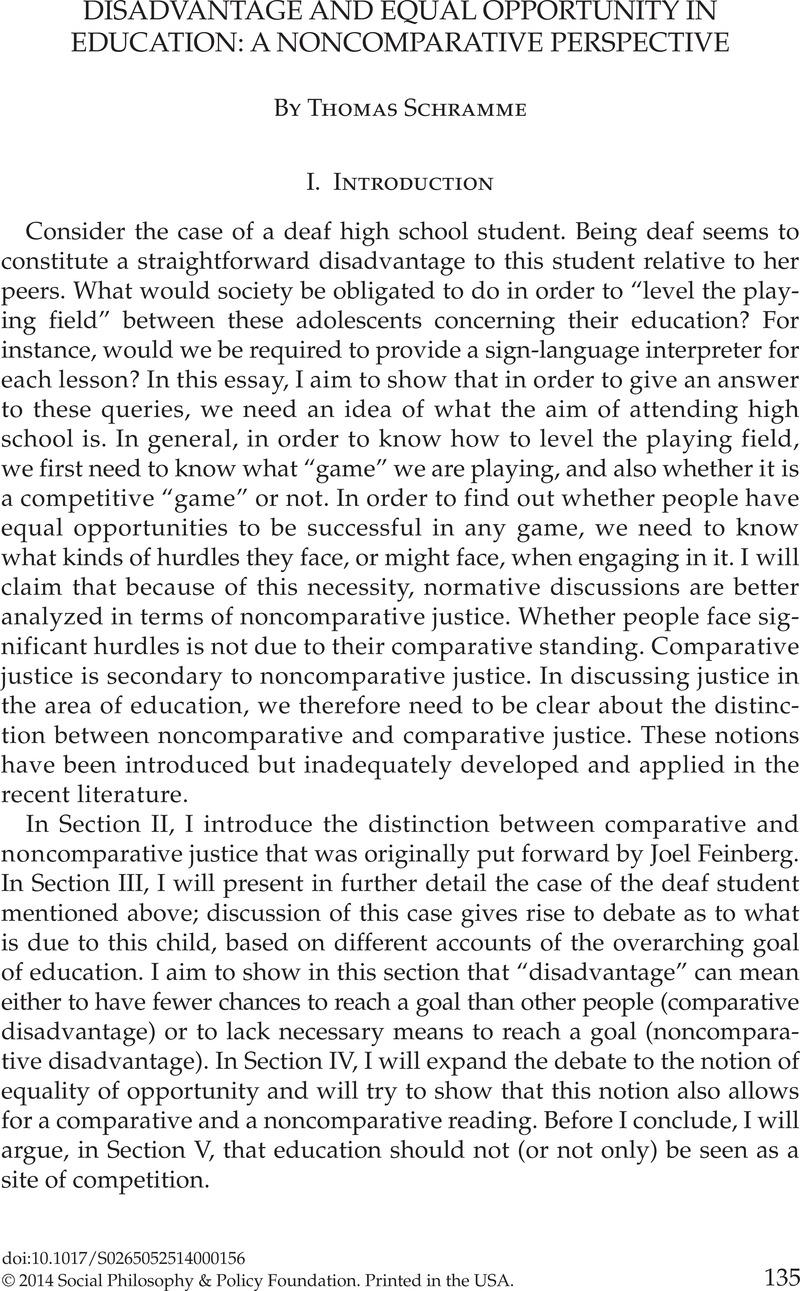Article contents
DISADVANTAGE AND EQUAL OPPORTUNITY IN EDUCATION: A NONCOMPARATIVE PERSPECTIVE
Published online by Cambridge University Press: 30 December 2014
Abstract

- Type
- Research Article
- Information
- Copyright
- Copyright © Social Philosophy and Policy Foundation 2014
References
1 Feinberg, Joel, Social Philosophy (Englewood Cliffs, New Jersey: Prentice Hall, 1973), 98–99.Google Scholar
2 The term “comparative justice” was recently employed in a different sense by Amartya Sen in The Idea of Justice (Cambridge, MA: Harvard University Press, 2009). There is also some debate in political philosophy regarding comparative and noncomparative desert (see, e.g., Serena Olsaretti, Liberty, Desert, and the Market (Cambridge, UK: Cambridge University Press, 2004), 34ff., or several papers in Serena Olsaretti, ed., Desert and Justice (Oxford: Clarendon Press, 2003).
3 Feinberg, Joel, “Non-Comparative Justice,” Philosophical Review 83 (1974): 298.CrossRefGoogle Scholar Feinberg gives other descriptions of the distinction, which are slightly different and in fact raise some concerns. Since I am here not interested in an exegesis of Feinberg's account, but in the distinction between comparative and noncomparative justice properly conceived, it is enough to refer the interested reader to the essays by Montague ( Montague, Phillip, “Comparative and Non-Comparative Justice,” The Philosophical Quarterly 30, no. 119 [1980]: 131–40CrossRefGoogle Scholar) and Hoffman (Joshua Hoffman, “A New Theory of Comparative and Noncomparative Justice,” Philosophical Studies 70 [1993]: 165–83).
4 Feinberg, Social Philosophy, 99; Parfit, Derek, “Equality and Priority,” Ratio 10, no. 3 (1997): 207.CrossRefGoogle Scholar
5 Feinberg, “Non-Comparative Justice,” 299.
6 Such a dynamic element is also discussed in Chambers, Clare, “Each outcome is another opportunity: Problems with the Moment of Equal Opportunity,” Politics, Philosophy, and Economics 8, no. 4 (2009): 374–400.CrossRefGoogle Scholar
7 Segall, Shlomi, Equality and Opportunity, (Oxford: Oxford University Press, 2013), 42.CrossRefGoogle Scholar
8 Note that strictly speaking it is not the physical or mental condition of the disabled people that is deemed unjust by egalitarians but the fact that they are worse off than others. The latter is usually due to the actions or omissions of others, though the condition itself is often not caused by acts of other people — for instance, in case of genetic disabilities. It is the way society deals with bad brute luck that is of interest to the egalitarian, not how the worse-off situation of people came about. This, of course, can be challenged and the egalitarian would first need to argue why any case of unchosen disadvantage is indeed an injustice. We might hold that principles of justice simply do not apply in cases of “cosmic” disadvantage, because these are due to random events, and not capriciousness (David Schmidtz, Elements of Justice [Cambridge: Cambridge University Press, 2006], 216ff.).
9 Silvers, Anita, “No Talent? Beyond the Worst Off! A Diverse Theory of Justice for Disability,” in Brownlee, Kimberley and Cureton, Adam, eds., Disability and Disadvantage (Oxford: Oxford University Press, 2009), 180.Google Scholar
10 Obviously the supposed level of development regarding the goal of education would have to specified. At this point I merely want to say that such an exercise would lead to a noncomparative perspective on justice.
11 Ibid.
12 Ibid., 181.
13 Strictly speaking, trying to establish whether someone was hindered requires a comparison, because whether a hurdle is present is to be assessed relative to a given standard of necessary means. Yet the standards themselves are noncomparative, and do not require any interpersonal comparison.
14 Jonathan Wolff, “Disability Among Equals,” in Brownlee and Cureton eds., Disability and Disadvantage, 113; Harris, John, “Is There a Coherent Social Conception of Disability?” Journal of Medical Ethics 26 (2000): 95–100.CrossRefGoogle Scholar
15 But see my “Disability (Not) as a Harmful Condition: The Received View Challenged,” in: Jerome Bickenbach, Franziska Felder, and Barbara Schmitz, eds., Disability and the Good Human Life (Cambridge, UK: Cambridge University Press, 2014).
16 Westen, Peter, “The Concept of Equal Opportunity,” Ethics 95 (1985): 837–50.CrossRefGoogle Scholar Before putting the finishing touches on this essay, I came across a paper by Gopal Sreenivasan that draws very similar and more detailed distinctions regarding the concept of equality of opportunity. See Sreenivasan, “Equality, Opportunity, Ambiguity,” Politics, Philosophy, and Economics 13, no. 1 (2014): 82–92.
17 Daniels, Norman, Just Health (Cambridge: Cambridge University Press, 2007), 43.CrossRefGoogle Scholar
18 Wolff, Jonathan and De-Shalit, Avner, Disadvantage (Oxford: Oxford University Press, 2008), 9.Google Scholar
19 Cf. Segall, Equality and Opportunity, 19–20.
20 Note that the term “equality” has two different meanings in these two interpretations of equality of opportunity. In the comparative reading, “equal” specifies the opportunities of persons — they are supposed to be equal; hence it serves the function of an adjective. In the noncomparative reading, opportunities are specified in terms of a standard; “equality” here means that this standard applies to everyone, i.e., it is not meant as a predicate specifying opportunities. In the terminology of Raz, the latter usage of equal opportunity is a closure principle (Joseph Raz, The Morality of Freedom [Oxford: Clarendon Press, 1986], 220).
21 I say “seem to” because the claim would need some more backing regarding the causalities of the state of affairs. We cannot just assume on the grounds of statistical data regarding these whether people really had worse opportunities.
22 Satz, Debra, “Unequal Chances: Race, Class, and Schooling,” Theory and Research in Education 10, no. 2 (2012): 156.CrossRefGoogle Scholar
23 Peters, R. S., “The Justification of Education,” in: Peters, R. S., ed., The Philosophy of Education (Oxford: Oxford University Press, 1973), 239–67Google Scholar; cf. Schramme, Thomas, “Noncomparative Justice in Education,” in Meyer, Kirsten, ed., Education, Justice, and the Human Good, (London: Routledge, 2014), 51–64.Google Scholar
- 2
- Cited by




